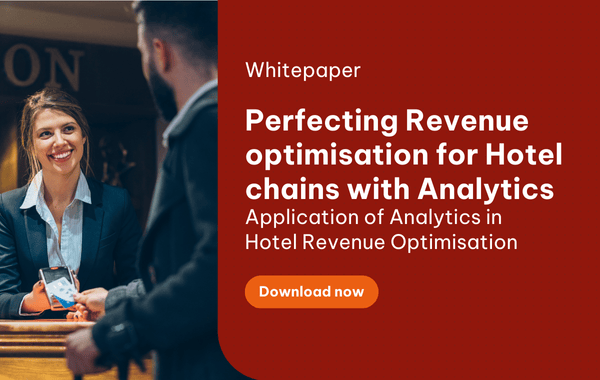Implementing new software can be a daunting task, especially when it comes to financial management in hotel businesses. However, with the right precautions and strategies in place, the process does not have to be overwhelming.
This blog post will serve as your comprehensive guide to navigating the implementation of cloud-based financial management systems.
TRG has already covered the numerous benefits of cloud technology, with a special focus on security. For more information on the basics of cloud computing, click here or check out this link to explore the advantages of transitioning accounting software to the cloud.
Read more: Modern Solutions that Empower Hotels to Overcome Challenges Today

Contents:
- Why choose cloud-based financial management software?
- Best practices for implementing cloud financial management in hotels
- 1. Define goals and objectives
- 2. Evaluate the current on-premises system
- 3. Select a suitable financial management solution
- 4. Develop a detailed implementation strategy
- 5. Select reliable vendors
- 6. Execute and maintain the transformation plan
- 7. Build change management and user adoption strategies
Why choose cloud-based financial management software?
Cloud computing is rapidly growing in the finance industry and is expected to continue growing in the coming years. As more businesses move to the cloud, the effectiveness of cloud-based financial software will become even more apparent.
Without exception, this technology offers a world of benefits to the financial management of hospitality businesses.
- Cost reduction: Cloud-based solutions can eliminate the need for expensive on-premises hardware and software, and they can also reduce IT maintenance costs by getting rid of physical infrastructure and depreciation.
- Scalability and flexibility: Cloud-based solutions can easily scale up or down to meet the hotel’s changing, seasonal needs when you expect rapid demands.
- Improved business performance: Cloud-based solutions can provide you with real-time insights into your financial data, which can help you make better business decisions as soon as possible.
- Accelerated digital transformation: Cloud-based solutions can help you integrate your financial data with other systems, such as property and customer relationship management. This compatibility is vital for digitalisation in the hospitality industry.
Read more: Financial Management in the Hospitality Industry: the Best Practices
Best practices for implementing cloud financial management in hotels
Utilising cloud solutions can offer numerous advantages for businesses, including quicker implementation processes with minimal downtime compared to traditional software. However, it is crucial to be mindful of potential issues and focus on key areas to ensure a seamless digital transformation project for your hotel business.
Read more: 10 Key Questions for CEOs to Ensure Financial Management Implementation Success
Below are some best practices for implementing financial management solutions that hoteliers should prioritise.
1. Define goals and objectives
Defining goals and objectives is the most crucial step in implementing a successful cloud financial management solution for hotel businesses. It sets the roadmap for the digital transformation project and ensures that the right tools are chosen for the job.
Businesses can assess cloud solutions and choose the one that best suits their needs by knowing the expected results. This analysis helps avoid features or functionalities that are unnecessary or incompatible with the hotel operation.
Moreover, clear goals help guide decision-making and support businesses in achieving desired implementation results. Goals also give organisations a foundation for distributing resources and measuring effectiveness, as well as allowing them to track the progress of the implementation project.
Read more: What is OKR? Benefits of the Google's Goal Setting System
2. Evaluate the current on-premises system
While the urge to implement the new solution immediately may be strong, it is wise for businesses to first invest time and resources into evaluating their current system and data holdings to determine priority levels. Trying to digitally transform all processes at once, even those within the same department, is not practical.
Therefore, a thorough assessment of what businesses currently possess and their respective values will provide a clearer roadmap for the implementation process ahead.
This evaluation process also provides great opportunities for businesses to identify technological or talent gaps and possible dangers that need addressing before implementation.
Read more: From On-Premises to Cloud: Strategy for a Successful Financial Management Transformation
3. Select a suitable financial management solution
There are many key criteria to consider when choosing a financial management solution:
- Adaptability: The ability to scale with the hotel business, accommodate growth or contraction in operations during high/low seasons, and offer flexible configurations and customisation options to fit the hotel‘s specific workflows and reporting needs.
- Process acceleration: Consider solutions that can automate manual tasks, streamline processes, and improve efficiency. Check for features like automated data entry, reconciliation, and reporting capabilities, and evaluate the user interface and workflow design for intuitiveness and ease of use.
- Embedded analytics: The solution should offer robust reporting and analytics tools, providing real-time insights into financial data. It is also important to analyse the depth and breadth of financial reporting available, including customisable dashboards and drill-down capabilities.
- Global features and functions: If the business operates internationally, ensure the solution supports multi-currency and multilingual capabilities while complying with global financial regulations and data privacy laws. Other features, like time zone management and remote access features for geographically dispersed teams, should also be evaluated.
- Data backup and recovery plan: Consider the frequency and location of backups, disaster recovery procedures, and data access controls.
Read more: How to Implement A Disaster Recovery Plan to Protect Your Financial Data?
4. Develop a detailed implementation strategy
Establishing a detailed implementation plan is crucial for the successful integration of a cloud financial management solution in a hotel business. This plan should include:
- A comprehensive execution roadmap that outlines the specific steps and timelines for the implementation process.
- A cost allocation framework to ensure that financial resources are allocated effectively and efficiently throughout the project.
Additionally, defining key performance indicators (KPIs) from the outset will help track progress, measure success, and identify any areas that may need adjustment.
Read more: OKRs vs KPIs: Which Goal Tracking System Should You Use?
By having a well-defined implementation plan in place, businesses can minimise the risk of unforeseen disasters and ensure smoother and more efficient project execution.
5. Select reliable vendors
If hoteliers are uncertain about where to begin, a good starting point is to explore top-tier vendors in the market to gain insight into current technology trends.
Opting for a top-tier vendor comes with its own advantages. These vendors are industry experts who invest heavily in infrastructure, offer robust disaster recovery plans, and provide 24/7 monitoring for every business
They are committed to innovation and regularly introduce new features, services, and improvements. Another advantage of working with reputable vendors is the extensive network of partners and third-party applications, creating a thriving ecosystem of resources and tools.
However, larger vendors are not the only option available. Hotel businesses may also benefit from consulting with smaller, lower-tier vendors.
Read more: Expert Advice on Choosing the Best SunSystems Implementation Partner
Consulting with their past and current clients is a fantastic place to start. In addition to asking the provider for references, actively contact these customers to learn more about their experiences. Pay close attention to important details like the length of their partnership with the vendor and their level of overall satisfaction. Discuss their likes, dislikes, and the cloud provider's responsiveness and support during the implementation.
Evaluating the vendor's business stability is also a need. As a stable vendor is more likely to offer dependable assistance and carry on improving their software over time, find out about the state of their firm to get a sense of how financially sound they are.
6. Execute and maintain the transformation plan
Besides selecting the right partner, it is important to establish a deployment team, including technical and project management experts. This team is responsible for connecting the execution team and technical stakeholders, developing goals, training staff, and ensuring smooth transformation.
During execution, businesses can minimise risks during data transfer by proactively testing non-critical data on the cloud platform beforehand. And remember to validate all the transferred data units to ensure functionality.
Moreover, it is critical to continuously monitor and optimise after migration. Hoteliers can gather user feedback and performance data to identify areas for improvement, eliminate redundant features for increased agility, and evaluate the security level of stored data for compliance.
Read more: How Infor SunSystems 6.4 Can Supercharge Your Digital Transformation
7. Build change management and user adoption strategies
Implementing a cloud financial management solution can be transformative for hotels, but navigating the change can be tricky. To ensure smooth sailing, prioritise effective change management and user adoption strategies.
Be well-prepared for the change. It is crucial to organise training sessions to communicate about this change early and often, explaining why and how the new solution impacts members of the hotels. Potential anxieties and resistance should be identified and discussed honestly and transparently. There should be a readily available support team to continuously receive questions and feedback, even when the implementation has ended.
Remember to start small and scale gradually for easier troubleshooting and optimising. Connecting the new system to tangible improvements in users’ daily work, like time-saving or better reporting, can foster their adoption. Do not forget to mark key achievements throughout the implementation process to maintain momentum and motivation.
Read more: A Beginner's Guide to SunSystems Cloud Training for End-Users
Implementing cloud financial management can be a transformative journey, one that brings hoteliers a real-time view of the current financial landscape for a more informed decision-making process.
Still unsure of where to start? Check out one of the solutions that TRG provides to Hospitality clients, Infor SunSystems, and see how it can supercharge your finance team.
 English
English  Vietnamese
Vietnamese 



